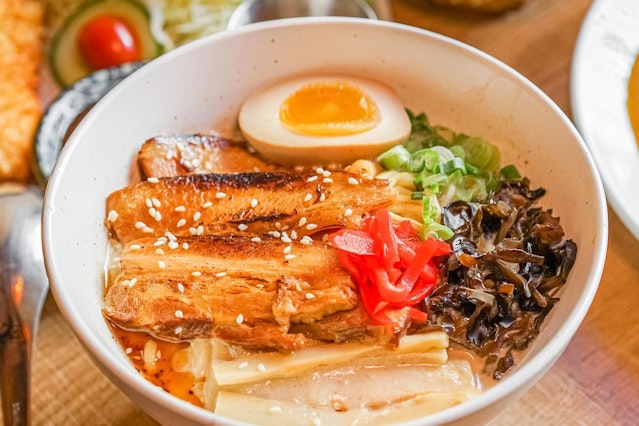Japanese Ramen Catering
Ramen, a hearty and savory Japanese noodle soup, has captured the palates of food enthusiasts all around the world. While its origins can be traced back to China, it was in Japan where ramen truly flourished, becoming a ubiquitous street food that captivated the locals after World War II. In the 1950s, the creation of instant ramen by Momofuku Ando revolutionized the food industry, providing a convenient and affordable meal option for millions around the globe. Ando's instant noodles quickly became a global phenomenon, introducing countless individuals to the wonders of this beloved dish. Today, gourmet ramen shops have surfaced in metropolitan cities across the world, serving up an array of styles and flavors that cater to diverse taste buds. From classic tonkotsu broth to contemporary fusion options, the variety of ramen offerings is truly staggering. It's that level of variety and customization that makes ramen a great option for your next event!
Japanese Ramen by City
Our Menus

What are the Differences between Each Type of Ramen?
The four most popular types of ramen are as follows: Shoyu Ramen: This is a classic ramen style with a clear broth that is flavored with soy sauce, resulting in a savory and slightly sweet taste. It is usually topped with sliced pork, green onions, bamboo shoots, and seaweed. Miso Ramen: Miso ramen features a broth that is flavored with fermented soybean paste. It has a rich and robust umami flavor that can vary in intensity depending on the type of miso used. It is often served with bean sprouts, corn, and butter. Tonkotsu Ramen: This type of ramen features a rich, milky broth that is made by simmering pork bones for several hours. It has a creamy texture and a deep pork flavor, and it is usually served with thin noodles and toppings such as sliced pork, green onions, and marinated bamboo shoots. Shio Ramen: This is a light and refreshing ramen that features a clear broth that is flavored with salt. It has a subtle, delicate taste and is often topped with seafood or chicken.

How will my Order be Delivered?
The way your order will be delivered will depend on how the restaurant prefers to do it. However, there is one important thing to keep in mind: the dry ingredients and broth will be delivered in separate containers to keep everything fresh and prevent sogginess. If a restaurant doesn't do this, it may be a sign that they are not experienced with delivery. If you order an individual style meal, you can expect to receive two containers. One container will have all the dry ingredients like noodles, protein, and toppings, while the other container will have the broth. This way, you can mix everything together at your own pace and enjoy your meal fresh and hot. For a buffet-style meal, things may be a bit different. The restaurant may pre-portion the dry ingredients (like noodles and protein) into containers for each person, and then have large hot boxes filled with broth for you to serve yourself. Alternatively, they may pre-portion the noodles and proteins, but let you add your own toppings from a DIY bar so you can customize your meal to your liking.

Don't Be Afraid to Slurp!
In Japan, it is considered polite to slurp your noodles as a sign of enjoying the dish. So go ahead and slurp away to fully savor the flavors and aromas of the ramen!
Frequently Asked Questions
What sides go well with Japanese ramen?
Japanese ramen is often paired with a variety of sides that can enhance the overall dining experience. Gyoza, for example, are Japanese-style dumplings that are filled with meat, vegetables, or seafood, and are usually pan-fried to give them a crispy texture. Takoyaki are small, ball-shaped snacks that are made with batter and diced octopus, and are typically served with a variety of toppings like mayonnaise and soy sauce. Edamame are boiled soybeans that are served in their pods and seasoned with salt, providing a healthy and flavorful side dish option. Karaage is Japanese-style fried chicken that is often seasoned with garlic and soy sauce, offering a savory protein-packed complement to ramen. Other popular sides include agedashi tofu, which is deep-fried tofu served in a hot broth, and yakitori, which are grilled chicken skewers that are usually glazed with a sweet soy sauce.
Can I order gluten-free Japanese ramen?
While Japanese ramen is traditionally made with wheat-based noodles and soy sauce, some restaurants do offer gluten-free options for customers with dietary restrictions. To find out whether an option is gluten-free, look for the (GF) indicator next to the item listed on the menu.
Are there vegan and vegetarian options for Japanese ramen?
Yes, there are typically vegan and vegetarian options available for Japanese ramen! While traditional ramen usually contains meat or fish-based broths, many restaurants now offer plant-based options for those following a vegan or vegetarian diet. One popular vegan/vegetarian ramen option is called "shoyu ramen", which is made with a soy sauce-based broth instead of a meat-based broth. Another option is "miso ramen", which uses a miso paste-based broth that is also typically vegetarian or vegan. In addition to the broth, many ramen restaurants offer vegetarian or vegan toppings that can be added to the dish. These might include tofu, mushrooms, bamboo shoots, seaweed, corn, and more.
What ingredients are in Japanese Ramen?
Ramen And Curries
- Chicken Karaage Curry
- Classic Shoyu Ramen with Pork Chashu
- Classic Shoyu with Grilled Chicken
- Classic Tonkotsu Ramen with Pork Chashu
- Curry Gyu
- Katsu Curry
- Sausage Curry
- Spicy Tonkotsu Ramen with Minced Pork
- Tokyo Tonkotsu Ramen with Pork Chashu
- Traditional Shio Ramen with Pork Chashu
- Traditional Shio with Grilled Chicken
- Vegetarian Broth Ramen with Tofu
CaterCow is the easiest way to order reliable catering from vetted restaurants
Vetted, Curated Menus
We screen for quality food, punctual deliveries, and responsive communication from all of our restaurants, caterers, and bakeries.
Buffet, Individually-Packaged, and Group Orders
Order individually-packaged meals or buffet style. If individual style, you have the option to send a link to teammates for a group order.
Ordering is a Breeze
You can order self-service online with a few clicks of a button. Or if you order frequently enough, we can provide an account manager.
Earn Rewards
Leave reviews of your orders, and you'll earn points that can be redeemed for future credits and Amazon rewards.






